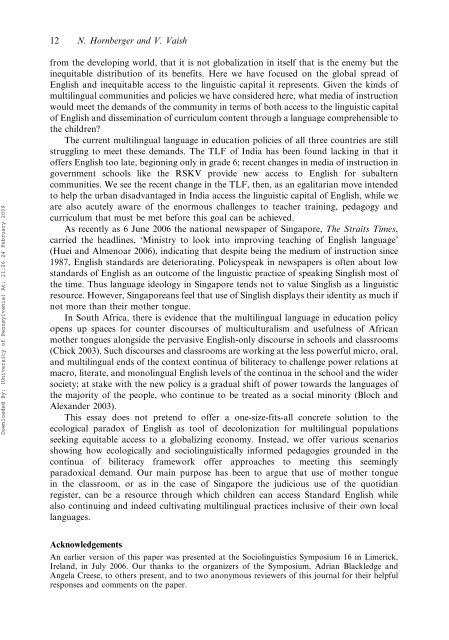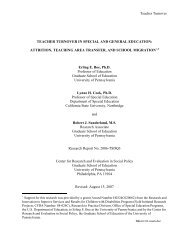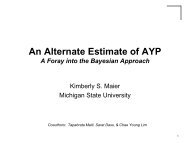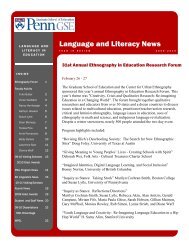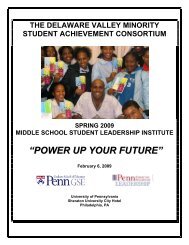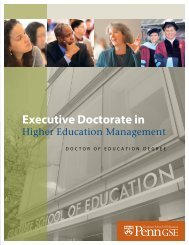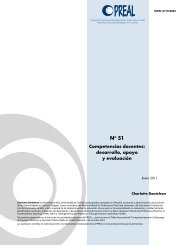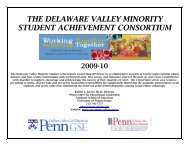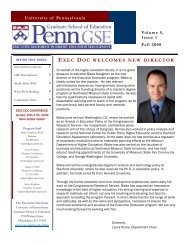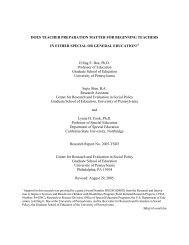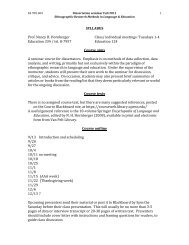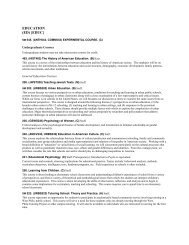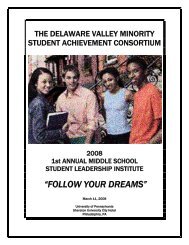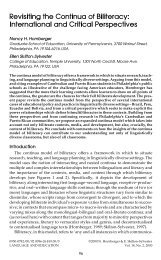Multilingual language policy and school linguistic practice
Multilingual language policy and school linguistic practice
Multilingual language policy and school linguistic practice
Create successful ePaper yourself
Turn your PDF publications into a flip-book with our unique Google optimized e-Paper software.
12 N. Hornberger <strong>and</strong> V. Vaish<br />
Downloaded By: [University of Pennsylvania] At: 21:26 24 February 2009<br />
from the developing world, that it is not globalization in itself that is the enemy but the<br />
inequitable distribution of its benefits. Here we have focused on the global spread of<br />
English <strong>and</strong> inequitable access to the <strong>linguistic</strong> capital it represents. Given the kinds of<br />
multilingual communities <strong>and</strong> policies we have considered here, what media of instruction<br />
would meet the dem<strong>and</strong>s of the community in terms of both access to the <strong>linguistic</strong> capital<br />
of English <strong>and</strong> dissemination of curriculum content through a <strong>language</strong> comprehensible to<br />
the children?<br />
The current multilingual <strong>language</strong> in education policies of all three countries are still<br />
struggling to meet these dem<strong>and</strong>s. The TLF of India has been found lacking in that it<br />
offers English too late, beginning only in grade 6; recent changes in media of instruction in<br />
government <strong>school</strong>s like the RSKV provide new access to English for subaltern<br />
communities. We see the recent change in the TLF, then, as an egalitarian move intended<br />
to help the urban disadvantaged in India access the <strong>linguistic</strong> capital of English, while we<br />
are also acutely aware of the enormous challenges to teacher training, pedagogy <strong>and</strong><br />
curriculum that must be met before this goal can be achieved.<br />
As recently as 6 June 2006 the national newspaper of Singapore, The Straits Times,<br />
carried the headlines, ‘Ministry to look into improving teaching of English <strong>language</strong>’<br />
(Huei <strong>and</strong> Almenoar 2006), indicating that despite being the medium of instruction since<br />
1987, English st<strong>and</strong>ards are deteriorating. Policyspeak in newspapers is often about low<br />
st<strong>and</strong>ards of English as an outcome of the <strong>linguistic</strong> <strong>practice</strong> of speaking Singlish most of<br />
the time. Thus <strong>language</strong> ideology in Singapore tends not to value Singlish as a <strong>linguistic</strong><br />
resource. However, Singaporeans feel that use of Singlish displays their identity as much if<br />
not more than their mother tongue.<br />
In South Africa, there is evidence that the multilingual <strong>language</strong> in education <strong>policy</strong><br />
opens up spaces for counter discourses of multiculturalism <strong>and</strong> usefulness of African<br />
mother tongues alongside the pervasive English-only discourse in <strong>school</strong>s <strong>and</strong> classrooms<br />
(Chick 2003). Such discourses <strong>and</strong> classrooms are working at the less powerful micro, oral,<br />
<strong>and</strong> multilingual ends of the context continua of biliteracy to challenge power relations at<br />
macro, literate, <strong>and</strong> monolingual English levels of the continua in the <strong>school</strong> <strong>and</strong> the wider<br />
society; at stake with the new <strong>policy</strong> is a gradual shift of power towards the <strong>language</strong>s of<br />
the majority of the people, who continue to be treated as a social minority (Bloch <strong>and</strong><br />
Alex<strong>and</strong>er 2003).<br />
This essay does not pretend to offer a one-size-fits-all concrete solution to the<br />
ecological paradox of English as tool of decolonization for multilingual populations<br />
seeking equitable access to a globalizing economy. Instead, we offer various scenarios<br />
showing how ecologically <strong>and</strong> socio<strong>linguistic</strong>ally informed pedagogies grounded in the<br />
continua of biliteracy framework offer approaches to meeting this seemingly<br />
paradoxical dem<strong>and</strong>. Our main purpose has been to argue that use of mother tongue<br />
in the classroom, or as in the case of Singapore the judicious use of the quotidian<br />
register, can be a resource through which children can access St<strong>and</strong>ard English while<br />
also continuing <strong>and</strong> indeed cultivating multilingual <strong>practice</strong>s inclusive of their own local<br />
<strong>language</strong>s.<br />
Acknowledgements<br />
An earlier version of this paper was presented at the Socio<strong>linguistic</strong>s Symposium 16 in Limerick,<br />
Irel<strong>and</strong>, in July 2006. Our thanks to the organizers of the Symposium, Adrian Blackledge <strong>and</strong><br />
Angela Creese, to others present, <strong>and</strong> to two anonymous reviewers of this journal for their helpful<br />
responses <strong>and</strong> comments on the paper.


